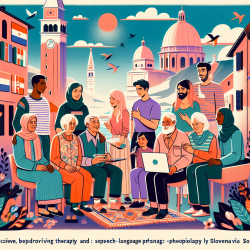Improving Practitioner Skills: Insights from Adolescent Young Caregivers in Italy and Slovenia

The study "Difficulties and Needs of Adolescent Young Caregivers of Grandparents in Italy and Slovenia: A Concurrent Mixed-Methods Study" provides valuable insights into the challenges faced by adolescent young caregivers (AYCs) and the support they need. This research can guide practitioners in improving their skills and enhancing the outcomes for children involved in caregiving roles. Here are some key takeaways and recommendations for practitioners:
Understanding the Challenges Faced by AYCs
The study highlights several difficulties experienced by AYCs in both Italy and Slovenia:
- Material Difficulties: AYCs often struggle with practical caregiving tasks, such as helping with mobility and managing therapy.
- Emotional and Psychological Strains: Slovenian AYCs, in particular, report significant emotional stress due to cohabiting with grandparents who have mental illnesses or dementia.
- Communication Problems: Italian AYCs frequently face challenges in communicating effectively with their grandparents, especially those with cognitive impairments.
Support Needs of AYCs
The research identifies specific support needs that practitioners can address:
- Material Support: This includes general and physical help, financial support, and information and training on caregiving tasks.
- Emotional and Moral Support: AYCs, especially in Slovenia, require emotional support from both formal services and informal networks like friends and family.
- Educational Support: AYCs benefit from flexible learning plans and understanding from schoolteachers to balance their caregiving responsibilities with academic demands.
Recommendations for Practitioners
Based on the study's findings, practitioners can implement the following strategies to better support AYCs:
- Enhance Home Health Care Services: Improve access to home health care services for older people, particularly those with dementia, to reduce the caregiving burden on AYCs.
- Provide Training for School Staff: Educate teachers, school managers, and social workers to recognize AYCs and offer appropriate support, such as flexible school schedules and psychoeducational interventions.
- Develop Responsive Education Opportunities: Create training programs that equip AYCs with the skills needed to manage caregiving tasks effectively and communicate with older people with disabilities.
- Promote Emotional Resilience: Implement psychoeducational interventions to build AYCs' resilience and improve their mental health and well-being.
Encouraging Further Research
The study underscores the need for ongoing research to fully understand the experiences of AYCs and develop effective support mechanisms. Practitioners are encouraged to stay informed about new findings and integrate evidence-based practices into their work.To read the original research paper, please follow this link:
Difficulties and Needs of Adolescent Young Caregivers of Grandparents in Italy and Slovenia: A Concurrent Mixed-Methods Study.
Citation: Santini, S., D’Amen, B., Socci, M., Di Rosa, M., Hanson, E., & Hlebec, V. (2022). Difficulties and Needs of Adolescent Young Caregivers of Grandparents in Italy and Slovenia: A Concurrent Mixed-Methods Study. International Journal of Environmental Research and Public Health, 19(5), 2837. https://doi.org/10.3390/ijerph19052837










